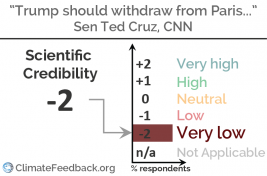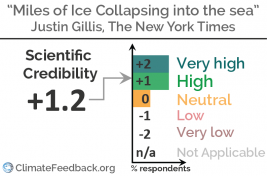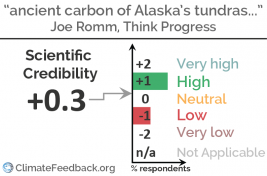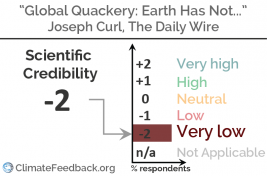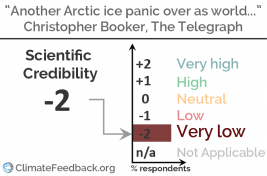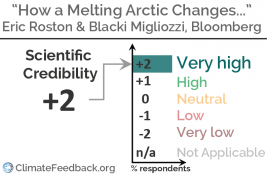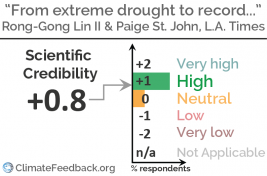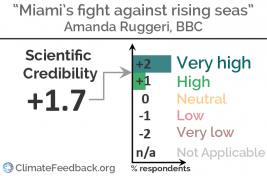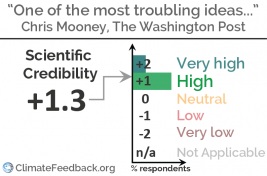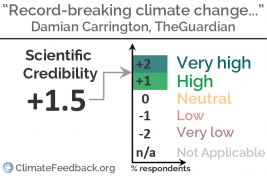Article Reviews
“Is this article consistent with the latest thinking and knowledge in science?”
“Would experts in this field endorse the main message of this article?”
These are the types of questions our “feedbacks” are designed to answer. If the feedback is positive, you can generally assume the information you’re reading is of high credibility. If it’s negative, however, you may want to read with extra care and attention — some of the information contained and conclusions reached are not consistent with science.[1]
In Paris Agreement op-ed, US Senator Ted Cruz misrepresents the costs and benefits of reducing greenhouse gas emissions
in CNN, by Senator Ted Cruz
Sen. Cruz’s article cites a single report that assessed only the costs of climate actions, relying on a series of assumptions that maximized those estimated costs, and that excluded the benefits of avoided climate change and of renewable sources of energy.
— 31 May 2017
New York Times series accurately describes research on Antarctic ice sheets and sea level rise, but highlights uncertain studies
in The New York Times, by Justin Gillis
"Generally scientifically sound, but caution should be displayed before basing discussion solely on a single modeling study, especially when it incorporates fundamentally different processes relative to other contemporary models."
— 23 May 2017
ThinkProgress story on thawing Alaskan tundra generally accurate but somewhat misleading
in Think Progress, by Joe Romm
"The writing is a bit over the top, but factually correct in general. The main weakness is in linking the solidly evidence-based observed changes from the Commane et al paper with much more speculative links such as the Siberian methane bubbles."
— 19 May 2017
The Daily Wire makes wild claims about climate change based on no evidence
in The Daily Wire, by Joseph Curl
"The article contains little to no rational treatment of observational data, but relies on heavily biased secondhand interpretation... Even the title is based on a lie. There is no 'study' that finds static temperatures for 19-years. This article is based on a newspaper article that makes this false statement based in turn on a blog post..."
— 09 May 2017
The Telegraph publishes false information about Arctic climate
in The Telegraph, by Christopher Booker
"This article suffers from a common error in reasoning. The author focuses on individual “snapshots” of the state of the climate while ignoring the long-term trends. Those trends occur over many decades and must be observed/considered over those time scales."
— 09 May 2017
Insightful Bloomberg coverage on the rapidly changing Arctic: sea ice melt and permafrost thawing
in Bloomberg, by Blacki Migliozzi & Eric Roston
Declining Arctic sea ice cover and thawing permafrost are both complex feedbacks that amplify global warming: The loss of reflective sea ice means more sunlight absorbed by the dark Arctic Ocean, while thawing permafrost can release greenhouse gases to the atmosphere.
— 21 Apr 2017
Analysis of “From extreme drought to record rain: Why California’s drought-to-deluge cycle is getting worse”
in Los Angeles Times, by Paige St. John and Rong-Gong Lin II
"The article is accurate and highlights the challenges that California’s water resource managers are facing due to climate change. There are some issues with differentiating natural climate variability and forced climate change but the main points are correct."
— 14 Apr 2017
Analysis of “Miami’s fight against rising seas”
in BBC, by Amanda Ruggeri
"The information in this story is generally correct—the frequency and severity of flooding is accelerating due to sea level rise, and the quoted scientists from NOAA and FAU are credible experts in this field."
— 07 Apr 2017
Analysis of “One of the most troubling ideas about climate change just found new evidence in its favor”
in The Washington Post, by Chris Mooney
"Overall, this piece accurately describes the findings of a new research paper by Mann et al on linkages between rapid Arctic warming and extreme weather at Earth's more temperate latitudes. While there are a couple of statements that are overly confident given available evidence in the peer-reviewed literature, the author generally does an excellent job placing this new work into the broader context of related studies over the past decade."
— 29 Mar 2017
Analysis of “Record-breaking climate change pushes world into ‘uncharted territory’”
in The Guardian, by Damian Carrington
"The article clearly and concisely documents some of 2016's climate extremes and puts them in the context of the warming trend."
— 22 Mar 2017
[1] Note: These feedbacks do not constitute endorsements of the author’s political or economic ideology, rather they are assessments of the scientific foundations and reasoning of the argumentation contained within each article.

